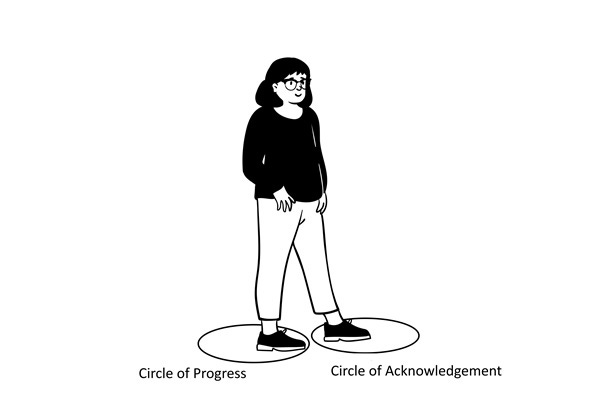50. How to stay out of ‘toxic positivity’
Balancing acknowledgment and progress is a key element of Solution Focus working, managing and leading.
This fiftieth issue of Steps To A Humanity Of Organisation (yay!) looks at the phenomenon of ‘toxic positivity’, how to spot and how to avoid it in our conversations at work (and everywhere else). I fear there’s a lot of it about, and some of that might be seen as being ‘solution focused’. It isn’t.
What is toxic positivity?
Ever been told, in the face of a tough situation, to “look on the bright side”? Annoying, isn’t it? This is a small example of toxic positivity. It happens when someone else insists that you take a positive view of your situation, when that doesn’t fit or feel right for you. We’re supposed to show up with a cheerful face, make the best of it, say “I’m fine”, take the positives, think about the many other fish in the sea, and whatever else.
The term has mushroomed in the last few years, partly as a result of works like Susan Cain’s 2022 book Bittersweet: How Sorrow And Longing Make Us Whole. I noticed it being discussed on Adam Grant’s Re:Thinking podcast when he interviewed emotional agility expert Susan David about it in January 2024; there’s a transcript if you’d rather skim through the conversation. She tells a story about her father dying on Friday and her mother sending her to school on Monday as if nothing had happened. This didn’t turn out well in the long run. She says:
I think the word toxic is often overused. I call it the tyranny of positivity. This is at its core an avoidant coping strategy. It is avoidant of the reality that is in front of you, and the same is experienced when we in our day-to-day lives live in a culture that tells us good vibes only. Just be positive. This is not making us more resilient. This is not helping us to have tough conversations, to understand shared values. When we avoid difficult emotions, we stay in a world of sometimes lack of wisdom and a lack of learning because we are unable to go to the discomfort of a real challenging conversation. When we tell people just to be positive, what we are actually saying to them is my comfort is more important than your reality.
They go on to discuss research showing the ‘lack of pessimism’ is more important than optimism when it comes to navigating emotions and the world, that thinking in terms of “how can I be helpful?” and “what can I contribute here?” is a useful way to go about things, and that avoiding the phrase “you made me feel…” is a good step (because that’s giving up your own agency over your emotions). It’s a good listen/read.
What really caught my attention was this graphic that Adam Grant shared along with the podcast on his Substack ‘Granted’.
Each of the things to say ‘instead’ are basically such good solution focused (SF) responses that I had to read it twice. Let’s see how it works with my model about the circles of acknowledgement and progress.
Circles of Acknowledgement and Progress
In work we usually start by asking people for their best hopes from our work together, with a view to starting to talk about a better future that’s useful to them. Sometimes people do just that. Other times, they want to tell you about their problems and difficulties anyway. Perhaps they expect to be asked about it. Perhaps they have been rehearsing it on the way over to see you. Whatever, it happens sometimes. Don’t panic. If there is ever to be a time for problem talk in an SF session, it is now. Listen hard, accept what they say and look for a chance to get back to their best hopes. This is a good time to use the circles of acknowledgement and progress.

Imagine two circles on the ground – the circle of acknowledgement and the circle of progress. As an SF practitioner, you are looking to balance acknowledgement questions/statements and progress questions/statements. You therefore stand with a foot in each circle. When things are going well, and the client is talking about ‘better’, then you can shift your weight onto the progress foot. You will be asking questions to expand on ‘better’. However, you still keep the ’acknowledgement’ foot in contact with the ground, as you will still be looking for chances to acknowledge the client’s tough situation, their coping, their struggle. A lot of SF work looks like this – plenty of questions about ‘better’.
However, if the client is finding things tough or challenging, then you may want to put more weight on the ‘acknowledgement’ foot. Slow down. Accept that the client is finding it tough for now. This is not being problem-focused, it’s taking the client seriously. Sometimes if they don’t think we’ve heard or recognised their struggle, they want to tell us again and be less inclined to come along with our progress questions.
The idea is that we never lose contact with either circle. There will always be chances to acknowledge, and always clues which may lead to progress. Even if we shift our weight from one foot to the other, both are always on the ground. If we only look for progress, we may risk trying to go faster than the client. If we only look to acknowledge, things may slow down or even stop.
In this opening phase of the conversation, we can look to acknowledge the problems and difficulties, and at the same time look for anything in the client’s responses which may be somehow connected with a better future. For example:
Client: It’s been awful… I have been stuck in the house, afraid to go outside, not seeing anyone for weeks on end… if only I could see my sister…
Practitioner: Ooh, that’s tough. (Acknowledging.) So… you’d like to see your sister? (Progress based on what the client has said.)
(The section above is adapted from Chapter 9, The Ticket Office, of my book The Next Generation of Solution Focused Practice (Routledge, 2021).)
Working Solutions Focus is not even (really) positive, let along toxically so
When people first see SF in action, or learn about it, they often say things like ‘Wow, that’s a very positive approach’. And in a way they are not wrong; compared to many other ways of working which start with an investigation of what’s wrong and why, there is immediately a different feel to the conversation.
However, the different feel is characterised as much by the space given to acknowledge how bad/tough/difficult things have been (if that’s what comes up) as well as to look for signs of progress. This isn’t really a positive focus, it’s a usefulness focus. What would our client / colleague find useful right now? Part of being a good SF worker is balancing putting ourselves at the service of the other, as well as having a responsibility to do something that can open space for something new to emerge.
This balances of being a step behind (serving) and being a step in front (setting an agenda) is one of the key things I’ve seen folk learn as they get more experienced. It’s tempting to start being all progress-focused, but that can come over as not listening or devaluing our clients’ experience. It doesn’t take much acknowledgement, in my view, to help people move towards a position of being in interested in a better future.
Conclusions
There’s a fine balance to being optimistically forward-looking and failing to notice that those around you need a bit of acknowledgement and space. What surprises me, again and again, is quite how little acknowledgement space can help people move towards a place where they can start to get actively interested in progress. Try it next time one of your colleagues or team members seems to be stuck and see what happens. Going slow, even for a few seconds, can make a lot of difference.
Dates and Mates
Exciting news that the third edition of The Solutions Focus is now on Amazon and (it says there) will be published on Thursday 9 May 2024. No doubt there will be a launch event online at some point! Book the date.
I was writing last week about working with complexity and how ‘stretching the world’ can change everything. There’s another valuable perspective about working with complexity coming up soon. Chris Corrigan and Caitlin Frost have another run of their Working With Complexity: Inside and Out online course running 11 April - 20 June (eight Thursdays). More details at https://harvest-moon-consultants.mykajabi.com/complexity-inside-out-registration.







Love this, Mark. It reminds me of doing Tai Chi.